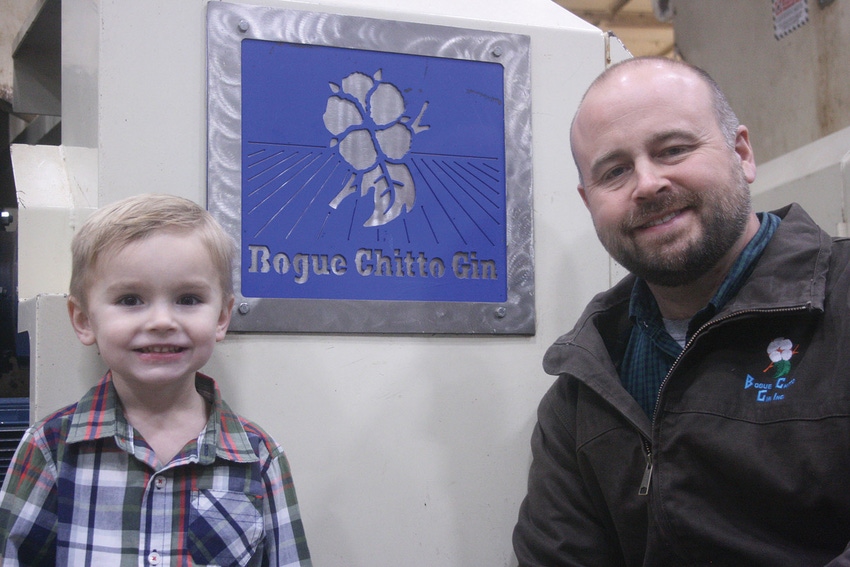March 1, 2021

The Bible tells us in Ecclesiastes 11:1 to “Cast your bread upon the waters for you will find it after many days.” Sometimes we find the bread comes back in some unexpected but rewarding ways.
Take Jonathan McBride, for example. Jonathan grew up in Webster County in east Mississippi. His father had a few cows when he was in high school, and he worked for Van Johnson, a Eupora, Miss., row crop farmer who had about 200 head of mama cows and 4,000 head of hogs.
“So, I really wasn’t involved in cotton until about the time I graduated from high school in 1996,” he said. “I attended a career day at Mississippi State University and met Tim Burcham and Eugene Columbus. At the time Southern Cotton Ginners was actively looking for some young people to come into the cotton ginning industry.
“I knew a couple of men who were in the industry, and I decided to investigate it a little further. I thought I wanted to be in ag engineering. The more I looked into ginning the more I decided I wanted to be involved. I’ve always enjoyed a challenge, and there seemed to be plenty of challenges available.”
As a result, McBride became one of the first three students to go through Mississippi State’s Gin Management and Technology Program, part of its four-year agricultural engineering, technology and business degree.
20 years later
 The gin stands that Jonathan McBride oversees at Bogue Chitto Gin are capable of processing 80-plus bales per hour. (Aaron Litwiller)
The gin stands that Jonathan McBride oversees at Bogue Chitto Gin are capable of processing 80-plus bales per hour. (Aaron Litwiller)
That launched a 20-year career in ginning that has led to McBride being named the 2021 Southern Cotton Ginners Association Ginner of the year. He was honored during the SCGA’s annual awards ceremony on February 25.
“We each had to serve a semester inside a cotton gin as one of the requirements of our Southern Cotton Ginners Association scholarships,” he said. “I went to work for Mr. Johnny George and Mr. Will Frank Walker at Woodland Gin in the fall of 1999,” he said. “That was my first taste of actually working in a cotton gin.”
What happened next was indicative of what McBride has learned about the cotton ginning industry. “I don’t recall for sure what the meeting was, but Eugene Columbus was in Greenville, Miss., the next spring when he announced he had three students who had just graduated, and he was trying place at gins.”
Steve Washburn, the manager at Holly Bluff Gin in Holly Bluff, Miss., was at the meeting. Holly Bluff Gin planned to begin a partnership with what was then the Seward-Harris Gin in Louise, Miss., to build Silver Creek Gin.
“Steve was looking for someone to help be a part of that,” he said. “He called me, and I told him I would come talk with him. I went to work in the fall of 2000. Holly Bluff-Silver Creek Gin is where I have spent most of my time in this industry. I worked there through the 2016 crop and left in 2017 to work for Bogue Chitto Gin in Macon, Miss.”
Having grown up with cattle and little exposure to cotton, McBride said he had a lot to learn when he began working at Holly Bluff.
“I didn’t know anything about ginning,” he said with a chuckle. “Thankfully, there were some people who were patient with me and willing to help mold and shape and teach. People throughout the industry have given their knowledge and helped.
“As I matured and grew up and realized more than what was right in front of me, one of my joys has been being able to strive to make the gin more efficient and more consistent.’
That desire to improve the ginning product has carried over into his work at Bogue Chitto Gin, which was organized by producers in 2012 to serve the growing number of acres of cotton in Noxubee County in east Mississippi.
“Jonathan takes ginning very seriously,” said Aaron Litwiller, general manager at Bogue Chitto Gin who nominated McBride for the Ginner of the Year award. “Each producer’s cotton is handled with care to preserve the quality of their crop. He is always seeking improvement in the gin that would directly benefit the producer.”
Another calling
 Jonathan and Emily McBride and son, Benjamin, celebrate the end of the season at Boque Chitto Gin. The cotton bale is one of 106,061 ginned at Bogue Chitto in 2020. (Kenton Mast)
Jonathan and Emily McBride and son, Benjamin, celebrate the end of the season at Boque Chitto Gin. The cotton bale is one of 106,061 ginned at Bogue Chitto in 2020. (Kenton Mast)
Litwiller also wrote about McBride’s faith. “He is a follower of Jesus Christ and lives his life under His authority. He conducts business with complete integrity and honesty, knowing that his work is unto the Lord.”
McBride credits his former pastor at Holly Bluff Baptist Church with bringing he and his wife, Emily, closer to his faith. “In 2006, a new pastor with a young family came to the church. They were about our age, and the Lord just bonded us together.”
While he was at Holly Bluff, he became a deacon and joined the Gideon Ministry. “In 2013, the Lord called me to seminary. I attended New Orleans Baptist Theological Seminary, doing most of the work online.
“In the course of time we were without a pastor in Holly Bluff, and I filled the pulpit in 2015. In 2016, I decided I would put my name in for affirmation from the church to serve as their pastor, I was only the pastor there for a year. The Lord gave me the opportunity to help out where I could.”
That made leaving Holly Bluff more difficult, but there were other factors. “Bogue Chitto Gin offered me an opportunity to return home,” he said. “My wife and I are both from Webster County, and now we live between her folks and my folks.”
He has also continued work on another project he began at Holly Bluff – RFID technology. “We had a producer that came to me in 2011 and asked if we could use the RFID chip in the wrap on the round modules to provide information back to the producer? I told him I didn’t know why we couldn’t.”
Holly Bluff Gin had installed a Spider Unwrapper on its north module feeder to handle cotton from the first round-bale-module pickers in the Holly Bluff area. “We were using a RFID reader to locate the cut on the on the Spider,” he said.
That question began an effort to help producers use the RFID chip in each round module wrapper to better understand what’s happening in their cotton. Since then, McBride has been working with Cotton Incorporated and USDA Agricultural Research Service scientists such as Dr. John Wanjura and others.
“I think there is a wealth of information to be obtained through the use of RFID technology,” he said. “We were providing RFID information to a number of producers at Silver Creek, and they still are. “We’ve been working to do that at Bogue Chitto Gin, as well, but it will require more automation to fully benefit the farmers here and to be better embraced by the industry.
��“It was one thing to do it at Silver Creek where we had two gins that were ginning about 35-plus bales an hour each,” he said. “It’s another thing to do it at a gin where we’re running across a single feeder to a single press, and we’re doing that at 80-plus bales an hour.”
Looking back, McBride says he has no regrets about choosing the ginning profession. “It certainly gets in your blood,” he said. “If you’re in the industry, it’s because the industry is in you. It’s not just something that you do.”
About the Author(s)
You May Also Like






